Agenda
Archives
Durant cette journée, les présentations suivantes ont été données:
Matinée (9h-12h30):
Présentation du projet et introduction de l’UCLouvain par A. Legay
Présentation de l’apport de l’ULiége par B. Donnet.
Présentation de l’apport de l’UNamur par X. Devroey
Présentation de l’apport de l’UMons par P. Mégret
Présentation de l’apport de l’ULB par J-M. Dricot
3 présentations industrielles de 30 minutes
RHEA – Présentation de RHEA par Douglas Wieme
ALSTOM – « Projet CYRUS – Plateforme Contribute » par Ch. MACK et M. ROUSSEAU
THALES – « Thales Trusted cloud approach » par Olivier Deleuze
Après-midi (14h – 18h):
Sensibilisation aux activités sensibles par la sureté de l’état par P. Petry
4 présentations scientifiques des 20 minutes :
« Zero-Touch Mutual Authentication Scheme for 6TiSCH Industrial IoT Networks » par Ali HAJ HASSAN (UMons)
« Network Fingerprinting: Routers under Attack » par Emeline Marechal (ULiège)
« Search-based crash reproduction meets API misuse detection » par Pr. Xavier Devroey (UNamur)
« PProx: efficient privacy for recommendation-as-a-service » par Pr. Etienne Riviere (UCLouvain)
Présentation des actvités de recherche en cybersécurité au CETIC et gestion de la cyber-factory par P. Massonet
Présentation des actvités de recherche en cybersécurité de Multitel par N. Point
Introduction au transfert de connaissances, aux bonnes pratiques en matière de gestion de propriété intellectuelle et plus globalement présenter ce que les interfaces universités-entreprises peuvent apporter au projet CyberExcellence par S. Adam. (UCLouvain)
Meeting & Séminaires
Lors de ce premier séminaire, Sébastien Dupont a présenté la plateforme « Cyber » Factory. Ce séminaire a été l’occasion de présenter dès le début du projet, l’outil “Factory”: quelles sont ses caractéristiques, quels services y sont disponibles, quelle architecture et comment les partenaires CyberExcellence peuvent en bénéficier.
Présentation “Building private-by-design IoT systems » par Igor Zavalyshyn (UCLouvain). Cet exposé présente les réseaux IoT domestiques et se focalisera sur les moyens de protection à mettre en œuvre pour mieux les sécuriser.
Présentation “Zero-Touch Mutual Authentication Scheme for 6TiSCH Industrial IoT Networks« par Ali Haj-Hassan (UMONS and Université Polytechnique Hauts-de-France). Les réseaux IoT industriels (IIoT) doivent offrir fiabilité, déterminisme et sécurité. En termes de sécurité, assurer une authentification efficace reste une tâche difficile. La plupart des approches d’authentification adoptées dans les protocoles de communication sans fil IIoT reposent sur l’existence d’une clé pré-partagée (PSK) entre chaque nœud de jonction et l’autorité centrale du réseau. Les normes ne spécifient néanmoins pas comment partager le PSK. Cet exposé propose un nouveau protocole d’authentification mutuelle et d’établissement de clé pour l’IIoT.
Présentation « Exploring Internet services mis-configuration at scale » par Willems and Boddin (LeakIX). Cette présentation démontre que même si les vulnérabilités des services exposés peuvent être dangereuses, le problème de laisser ces services non configurés ou avec des informations d’identification par défaut est tout aussi important. Devops et les artefacts de déploiement sont également développés.
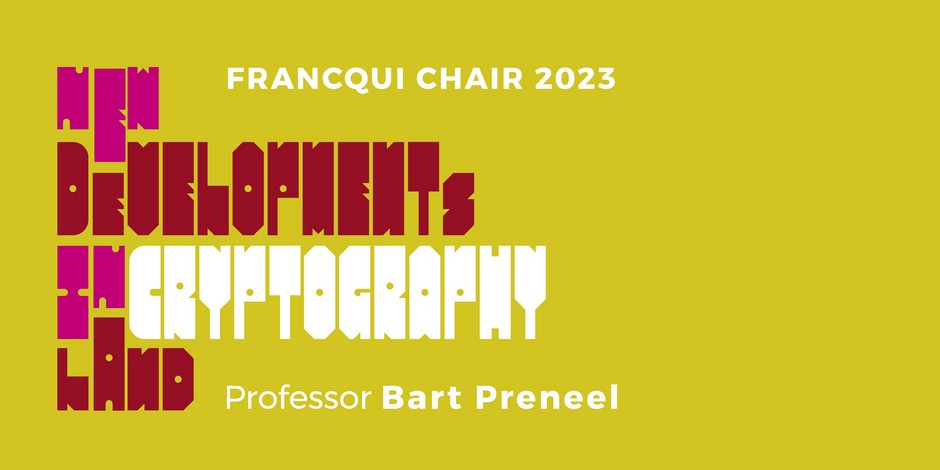
Prof. Bart Preneel is a full professor at the KU Leuven, where he heads the COSIC research group, which has 100 members. He was visiting professor at five universities in Europe. His main research interests are cryptography, cybersecurity and privacy. He received several awards including the RSA Award for Excellence in the Field of Mathematics (2014) and is a fellow of the IACR. He is co-founder of the start-up nextAuth and serves on the (Advisory) Board of five companies. Bart Preneel frequently consults for industry and government and has been actively involved in cybersecurity policy debates.
Inaugural lecture :
Wednesday February 8, 2023 at 5:00 PM : New Developments in Cryptography Land
Other lectures :
WEDNESDAY, FEBRUARY 15, 2023 at 4:15 PM : The quantum threat and post-quantum cryptography
WEDNESDAY, FEBRUARY 22, 2023 at 4:15 PM Computing on encrypted data
WEDNESDAY, MARCH 1, 2023 at 4:15 PM : Cybersecurity policy and lawful access
WEDNESDAY, MARCH 8, 2023 at 8:00 PM : Fear and trust in cybersecurity – Lesson followed by interdisciplinary debate.
Présentation « Adaptive self-guarded honeypot » par Sereysethy TOUCH (UNAMUR ).
Antoine SACRE, UNAMUR
Title: Automatic compliance assessment of IT systems
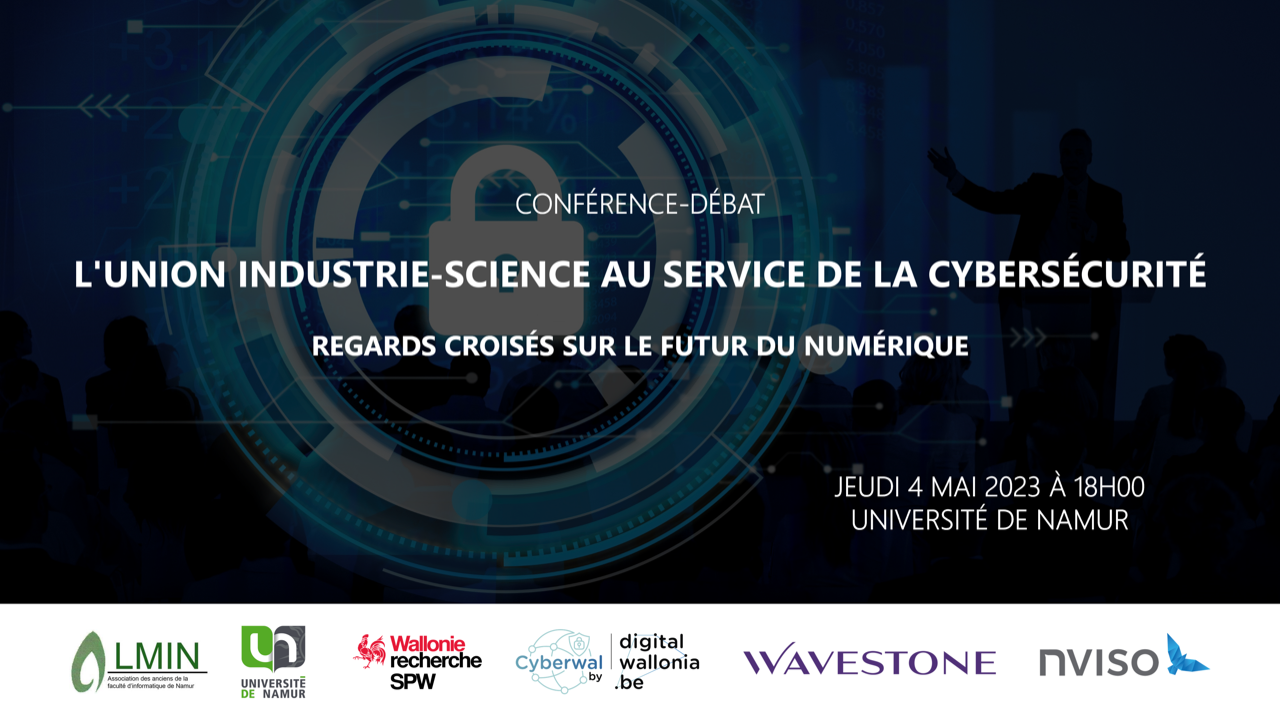
Le jeudi 4 mai prochain, l’ALMIN, l’association des anciens de la faculté d’informatique de l’Université de Namur organise une conférence-débat sur le thème de la cybersécurité et en particulier sur L’union industrie-science au service de la cybersécurité : regards croisés sur le futur du numérique.
Des chercheurs du projet CyberExcellence, ainsi que des intervenants de Wavestone Belgium et NVISO présenteront et discuteront ensemble des travaux actuels et futurs en matière de cybersécurité. Cet échange en regards croisés sera l’occasion pour tout un chacun de démystifier et d’en apprendre davantage sur un sujet qui occupe une place de plus en plus importante dans les débats.
En pratique, plusieurs présentations seront suivies d’un débat entre l’audience et les intervenants. La soirée se clôturera par un drink assuré par le Cercle Info de la Faculté d’Informatique.
L’inscription est gratuite mais souhaitée pour des raisons d’organisation : https://framaforms.org/lunion-industrie-science-au-service-de-la-cybersecurite-regards-croises-sur-le-futur-du-numerique
Date: Jeudi 4 mai de 18h00 à 23h00
Lieu: Auditoire PA02, Université de Namur, Rue de Bruxelles 69, 5000 Namur
Programme:
– 18:00 : Introduction
– 18:15 : Présentations par les doctorants CyberExcellence et professeur de la Faculté d’Informatique de l’UNamur, de Wavestone Belgium et de NVISO.
– 20:00 : Débat
– 20:30 : Drink
– 23:00 : Fin de la soirée
Plus d’informations sur l’événement Facebook (https://www.facebook.com/events/1654945131601172) ou LinkedIn (https://www.linkedin.com/events/conf-rence-d-bat-l-unionindustr7049761831040503809/).
Présentation « Automatic modulation recognition » par Alexander Gros (UMONS)
Abstract:
On the one hand, the AMR (Automatic Modulation Recognition) realm has recently shown an increase of interest, particularly as an application for monitoring the physical layer of wireless transmissions. It consists in determining the employed modulation type of a sensed Radio Frequency (RF) signal at a given time, space and frequency.
On the other hand, Bivariate Empirical Mode Decomposition (BEMD) is a signal decomposition method that can distill signals into a finite number of Intrinsic Mode Functions (IMFs) through a process known as sifting. BEMD is specifically designed to decompose bivariate (e.g. complex) signals, such as complex IQ samples of telecommunication data time series. The IMFs in conjunction with an AI architecture permits modulation classification.
In this seminar, we will see the operating mechanism of the system, if the decomposition parameters affect the classification rate, how we might improve the AI architecture and also get a glimpse of Explainable AI (XAI).
Présentation « An introduction to Physically Unclonable Functions (PUFs) » par Cédrick De Pauw (ULB ).
Présentation et coordination par Philippe Massonet (CETIC).
Thomas Krenc, « Finding the Needle in the Haystack: Surgical Attacks on Internet Infrastructure »
Yuko Hara-Azumi, « Power Side-channel Leakage and Its Countermeasure in the High-Level Synthesis based Design Flow »
Journées des chercheurs
Une première journée des chercheurs a été organisée le mardi 8/11/2022 à Mons. Cette journée fut l’occasion pour les différents chercheurs (notamment les nouveaux engagés) travaillant sur le projet CyberExcellence de se rencontrer, présenter leur recherche et échanger sur les synergies et collaborations à mettre en œuvre.
Retrouvez ci-dessous les présentations et les posters présentés par les chercheurs au cours de la journée :
Posters :
Cédrick De Pauw (ULB) – An introduction to physical unclonable functions and their applications
Justine Ramelot (UCLOUVAIN) – Cyber Range Scenarios (CRS2)
Ewan Gencsek – Low OSI Layer Security of Internet of Things Systems
Francois De Keersmaeker (UCLOUVAIN) – Dynamic monitoring and protection of heterogeneous IoT applications
Guillaune Nguyen – Identification of Cyber Physical System (CPS) & Orchestration of fuzzing testing
Jules Dejaeghere – Anonymous Communication Networks
Tom Rousseau (UCLOUVAIN) – Software Testing meets Formal Verification for the Good
Présentations :
Christophe Crochet (UCLOUVAIN) – SEMA Symbolic Execution toolchain for Malware Analysis – Packing
Antoine Sacre (COMEXIS) – ARRCIS : Évaluation et renforcement de la conformité d’un système d’information
Sebastien Dupont (CETIC), Guillaume Ginis (CETIC) – Orchestration and Observability
Charles-Henry Bertrand Van Ouytsel (UCLOUVAIN) – Détection de packing par méthodes de machine learning
Philippe Massonnet (CETIC) – Défis Collectifs Industriels
Denis Darquennes (CETIC) – Tests generation for cyber security
Ertms Kiere Vasseur (MULTITEL) – Gestion des clefs et communication inter-KMC dans le domaine ferroviaire
Sebastien Dupont (CETIC), Nicolas Point (MULTITEL) – Cyber Factory
Justine Ramelot (UCLOUVAIN) – Cyber Range Scenarios (CRS2)
Martin Vivian (UCLOUVAIN) – Improvements for stateful fuzzing
Phithak Thaenkaew (UMONS) – Evaluating the cost of beyond AES-128 LoRaWAN security
Wilson Daubry – Decentralized group authentification with membership in the Smart Grid
Xavier Lessage (CETIC) – Secure Federated Learning
Alexander Gros (UMONS) – Electromagnetism and Telecommunication Department Faculty of Engineering
Serey Touch (UNAMUR) – Adaptive Self-guarded Honeypot
Benoit Duhoux (UCLOUVAIN) – « Use of a solver to generate scenarios for cyber ranges based on contextual information »
Une deuxième journée des chercheurs s’est déroulée sur le site de l’Uliège le 06 avril 2023.
Retrouvez le programme et les présentations ci-dessous :
Program & presentations :
08h30 – 09h00: welcome/breakfast
09h00 – 09h10: welcome speech (Axel Legay)
09h10 — 10h30: 1st Session
Eric Vyncke (Cisco): « IPv6 more Secure than IPv4? »
Loïc Champagne (ULiège): « Improving Data Center Network Resilience and Availability through Path Load Balancing Strategies »
10h30 — 10h50: Coffee Break
10h50 — 12h20: 2nd Session
François de Keersmaker (UCLouvain) : « Adaptive Anomaly-Based Firewall for Smart Homes » (WP2)
Ewan Gencsej (UMons): « Physical Layer Authentication » (WP4)
Guillaume Nguyen (UNamur): « Identification and Classification of CPS » (WP6)
12h20 — 14h00: Lunch + Open Discussions
14h00 — 15h20: 3rd Session
Nicolas Point (Multitel) : « Configuration sécurisée d’infrastructure de communication IoT « by design » »
Nicolas Point (Multitel) : « Defis Collectifs Idustriels »
Guillaume Ginis (CETIC) : « Défi 01 « Automatisation de la vérification cybersécurité de systèmes cyber physiques »
Christophe Ponsard (CETIC): « Progress status of challenge#2 about risk management for pentesting »
Sébastien Dupont (CETIC): « progress status on challenge#4 Security « by design » for cyber physical
15h20 — 15h50: Coffee Break + Open Discussions
15h50 — 16h30: 4th Session
Sébastien Adam (UCLouvain): « Managing open-source licensing » (WP6)
16h30 — 16h40: Closing speech (Axel Legay)
Un comité scientifique et un comité de pilotage a également été organisé dans le cadre de la journée.
















Une journée des chercheurs sur les Grands Défis s’est déroulée sur le site du CETIC le 11 octobre 2023.
Retrouvez le programme ci-dessous :
Agenda :
- 09:00-09:30: Accueil au CETIC
- 09:30-10:00: Méthodologie défis industriels collectifs (salle Turing, Philippe Massonet)
- 10:00-11:00: Présentation de la factory (salle Turing, …)
- 11:00-11:15: Break
- 11:15-12:30: Utilisation de la Factory par les chercheurs (salle Turing, …)
- 12:30-13:30: Lunch
- 13:30-15:00: Réunion par défi en // – 5 défis initiaux + 2 défis émergents (1 salle par défi, responsables de défi)
- 15:00-15:15: Break
- 15:15-17:00: suite Réunion par défi
Grands Défis
Présentation des Grands Défis par le CETIC et des académiques disponible sur cette page.
Retour sur les défis et identification des problèmes de recherche. Présentation par Philippe Massonnet.
Présentation par Philippe Massonet (CETIC), Sébastien Dupont (CETIC), Guillaume Ginis (CETIC), Guillaume NGuyen (UNAMUR) & Martin Vivian (UCLOUVAIN).
Programme :
–> 10:00-10:05 Rappel projet CyberExcellence, expérimentation dans la factory, et défi 01 (Philippe Massonet)
–> 10:05-10:20 Présentation des problèmes de recherches liés au défi:
•Identification of Cyber Physical System (CPS) & Orchestration of fuzzing testing (Guillaume Ginis)
•Improvements for stateful fuzzing, (Martin Vivian)
•Tests generation for cyber security (Philippe Massonet)
–> 10:20-10:40 Présentation de l’étude de cas proposée pour expérimenter les algorithmes de génération de tests de cybersécurité (factory) (Sébastien Dupont et Guillaume Ginis)
–> 10:40-11:00 Discussion sur des vulnérabilités, défauts de conception à tester
Présentation par Philippe Massonet (CETIC), Antoine Sacré (UNAMUR), Serey Touch (UNAMUR), Justine Ramelot (UCLOUVAIN), Christophe Ponsart (CETIC), Guillaume Ginis (CETIC) & Sébastien Dupont (CETIC).
Programme :
–> 15:00-15:05 : Rappel projet CyberExcellence, expérimentation dans la factory, et défi 02 (Philippe Massonet)
–> 15:05-15:25 Présentation des problèmes de recherches liés au défi:
– Eval de conformité d’un SI & aspect processus, approche amont
(Antoine Sacré)
– Adaptive Self-guarded Honeypot & apprentissage “run-time”
(Serey Touch)
– Cyber Range Scenarios & aspect humains: utilisabilité, profils
(Justine Ramelot)
– Retour apprentissage analyse de risques & besoins/focus
(Christophe Ponsard)
–> 15:25-15:40 : Présentation des potentielles études de cas pour expérimenter des techniques de tests de pénétration dirigées par les risques (Guillaume Ginis, Sébastien Dupont)
–> 15:40-16:00 : Discussion sur le type de vulnérabilités, contraintes à prendre en compte et l’organisation du groupe
Présentation par Sébastien Dupont (CETIC)
Présentation par Philippe Massonnet (CETIC)
Présentation par Philippe Massonnet (CETIC)
Présentation coordonnée par Philippe Massonnet (CETIC)
Activités & Entreprises
Evénement annuel du Digital Lab qui sera consacré au thème des enjeux de cybersécurité pour nos entreprises en Wallonie. À cette occasion, Jean-Philippe Parmentier, directeur de l’INFOPOLE, interviendra aux côtés de l’AdN, l’UWE, l’UCL, Equans et Wavestone Belgium pour introduire la soirée.
Au programme (18:00 à 22:00 ) :
De courts échanges riches et variés entre différents acteurs reconnus pour leur expertise sur la question. Serons accueilli notamment Noémie Honoré, Directrice de Wavestone Belgium et membre de Women4Cyber, Jérémy Grandclaudon, Expert cyber à l’Agence du Numérique, Lisa Lombardi, Conseillère Numérique à l’UWE, Axel Legay, Professeur en cyber à l’UCL, Jean-Philippe Parmentier, Directeur de l’Infopole Cluster TIC, et Geoffroy Jennes, Senior Project Manager chez Equans.
Un keynote inspirant par Rosanna T.S. Kurrer, élue personnalité cybersécurité belge de l’année 2021. Cofondatrice et dirigeante de CyberWayFinder, la plateforme européenne qui forme des professionnels de la cybersécurité. Diplômée de l’université de Kyoto et oratrice accomplie, Rosanna souligne l’importance d’un état d’esprit de croissance, d’une approche axée sur l’action et d’une collaboration radicale.
Un passage en revue des réalisations d’HEC Liège sur l’année écoulée ainsi que des projets en cours et à venir du Digital Lab.

Le 2 juin a eu lieu le « Cyber4ASD » event à l’Euro Space Center (Transinne). Objectif : faire éclore des projets collaboratifs utilisant la Cybersécurité dans les secteurs de l’Aéronautique, du Spatial, de la Défense et des Drones.
Programme :
– Etat de l’art cybersécurité en Wallonie dans l’aéronautique, le spatial et les drones
– Expressions des besoins et des développements par des membres de Skywin
–Chiffrement
-Jumeaux numériques
-Communications quantiques
-Sécurisation des logiciels embarqués
-Intégrité des données
-Détection des attaques, résilience
-Formation
– Workshops dinatoires et idéation avec les meilleurs experts wallons de la cybersécurité
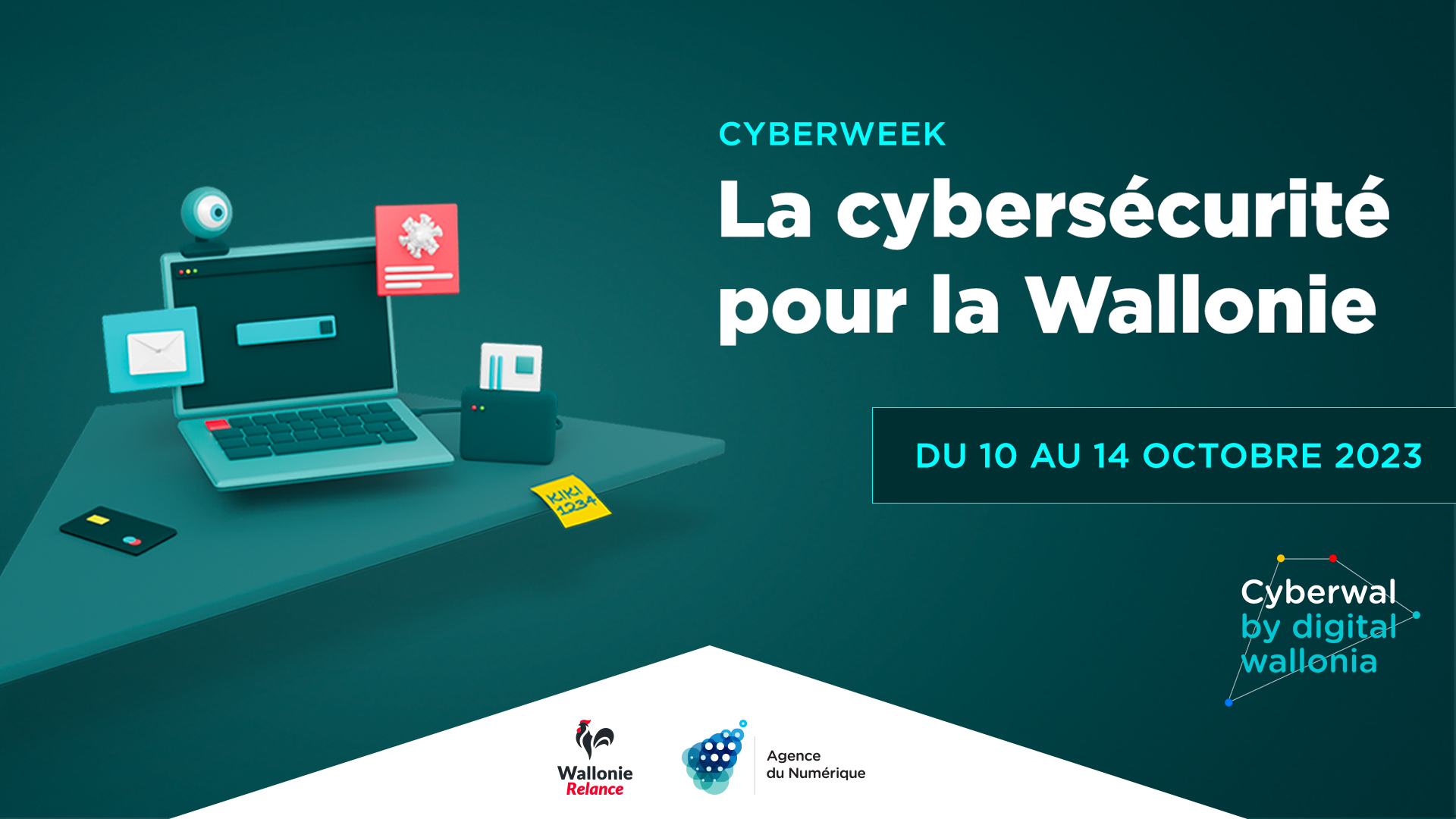
Cyberweek 2023 : Les futurs experts en cybersécurité, à vous de jouer!
Dans le cadre du programme Cyberwal by Digital Wallonia, l’Agence du Numérique organise un événement pour les étudiants passionnés par la cybersécurité. Venez rencontrer des recruteurs de premier plan et participez à une compétition de CTF(Capture The Flag) épique organisée par l’ASBL BEHack. Testez vos compétences, relevez des défis et montrez votre savoir-faire en sécurité numérique !
International
Présentation par Axel Legay
Présentation par Axel Legay
La Cyber School de CyberExcellence s’est déroulée sur le site Galaxia de Transinne qui, avec l’Agence spatiale européenne (ESA) et le centre ESEC de Redu, constitue un centre spatial de premier plan en Europe.
L’objectif de la semaine était de fournir aux chercheurs un enseignement théorique et pratique de haut niveau, à l’échelle européenne, et de relier directement les cours aux besoins du cyber-écosystème.
Pour retrouver le programme complet, rendez-vous sur le site web de l’évènement.
Pour retrouver les Présentations/Handbook/Virtual machine, rendez-vous sur le Dashboard.
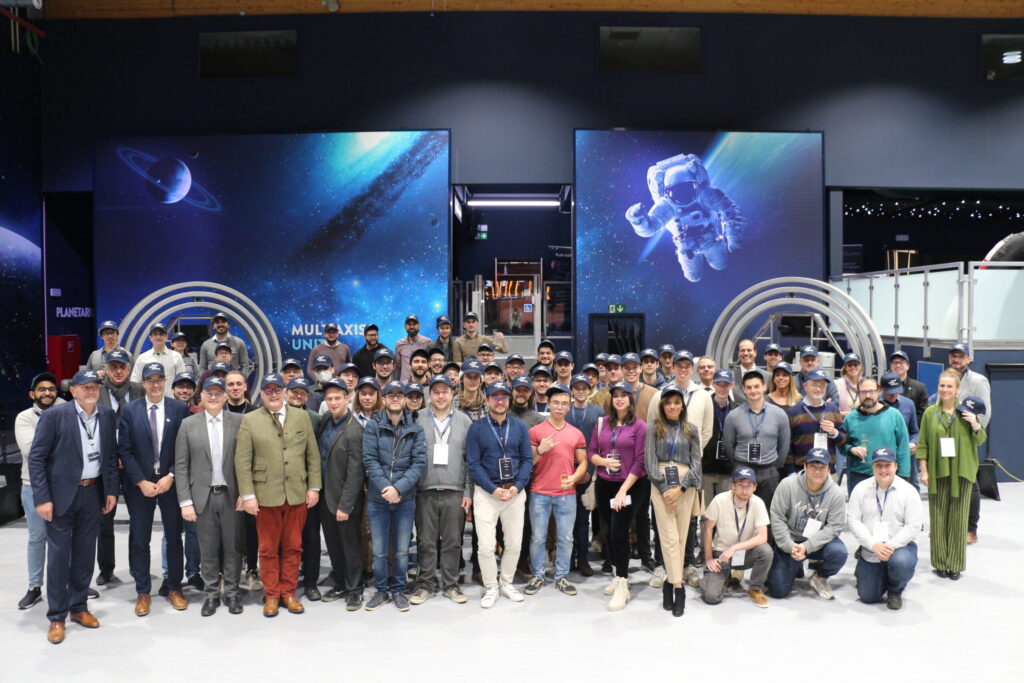
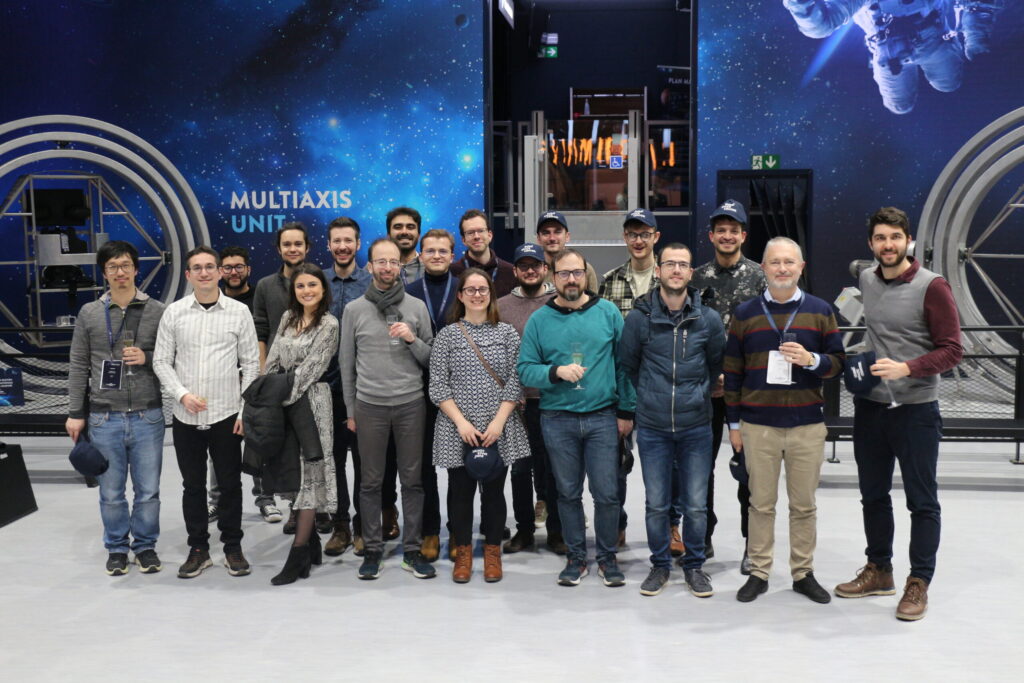
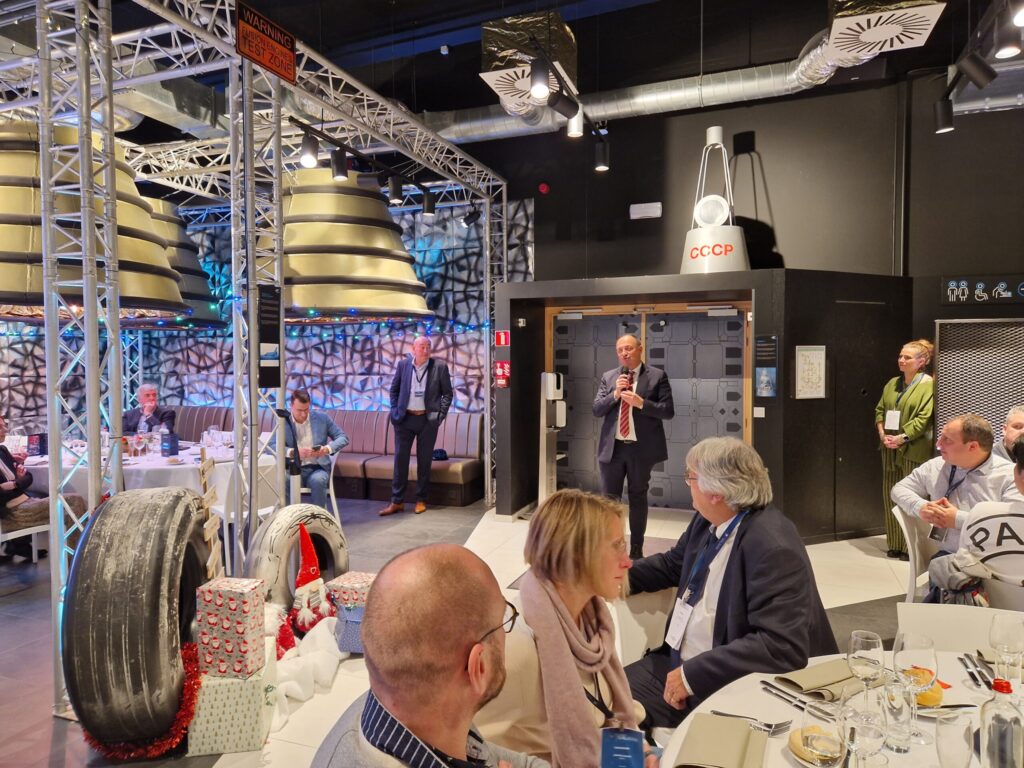
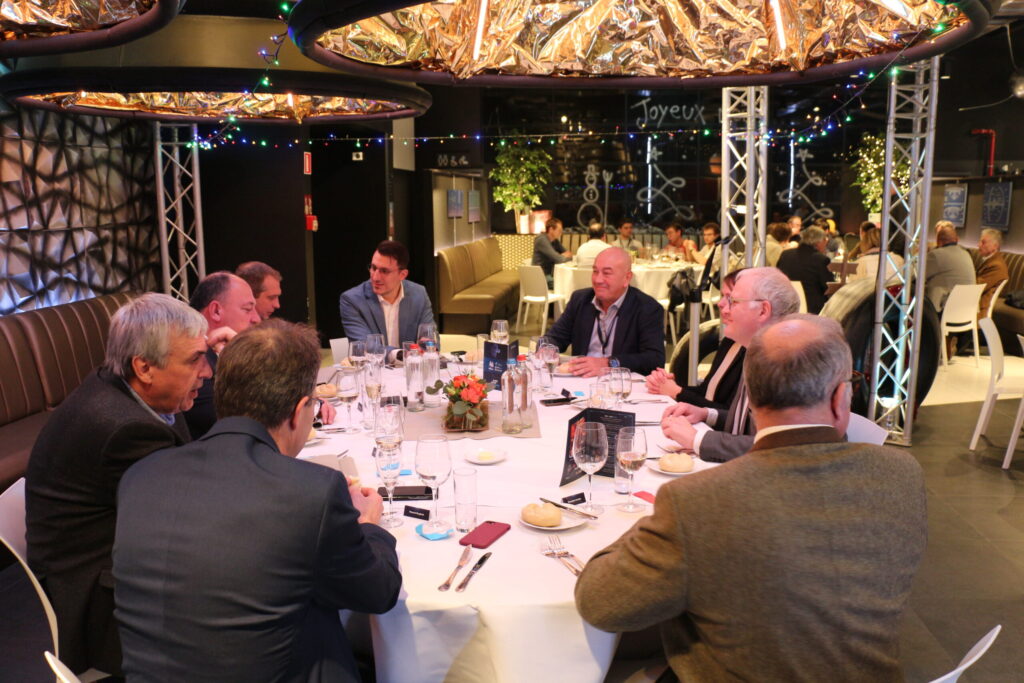
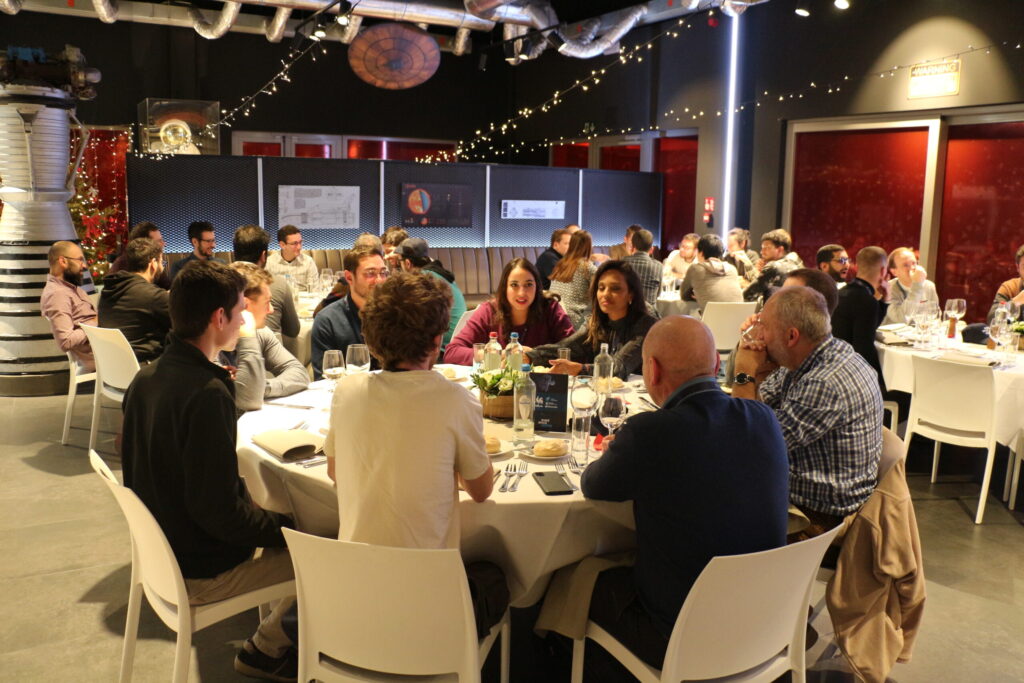
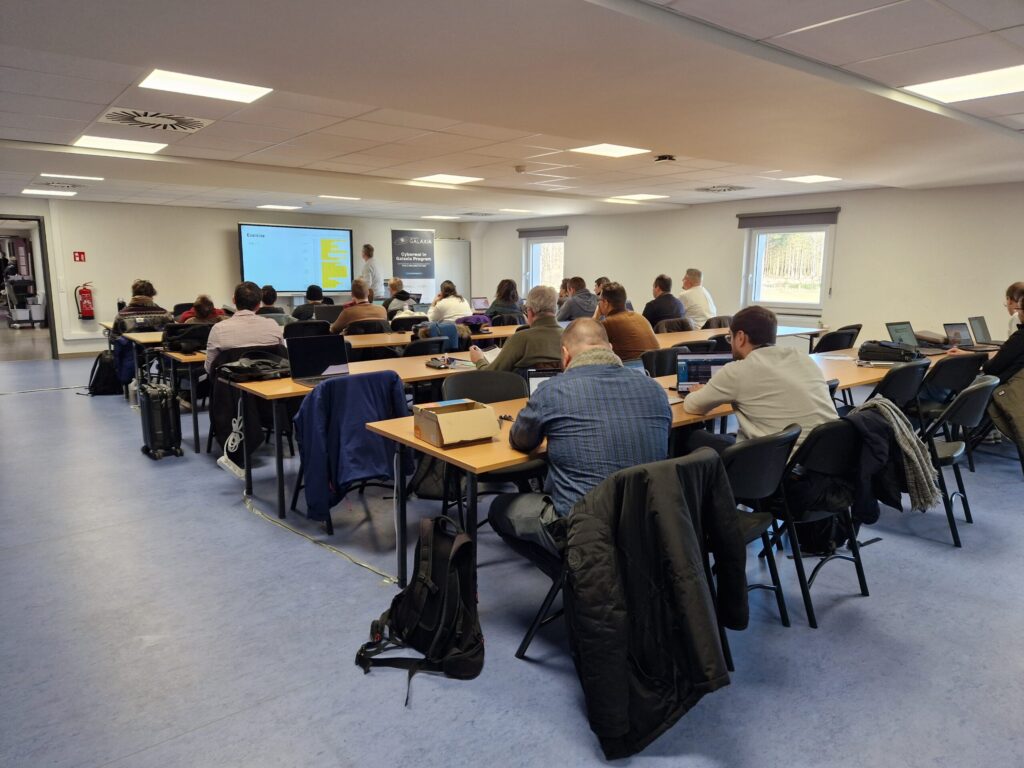
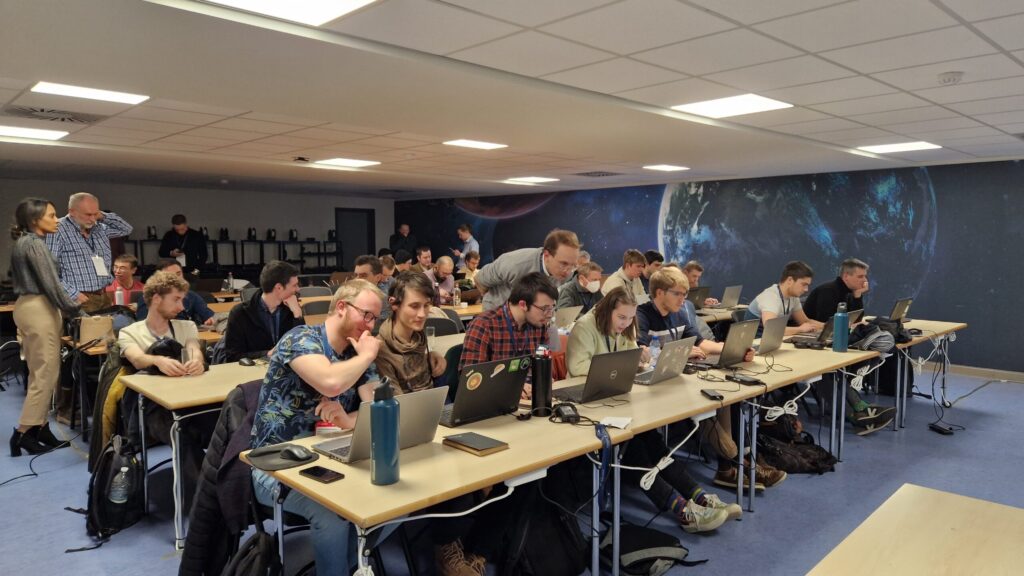
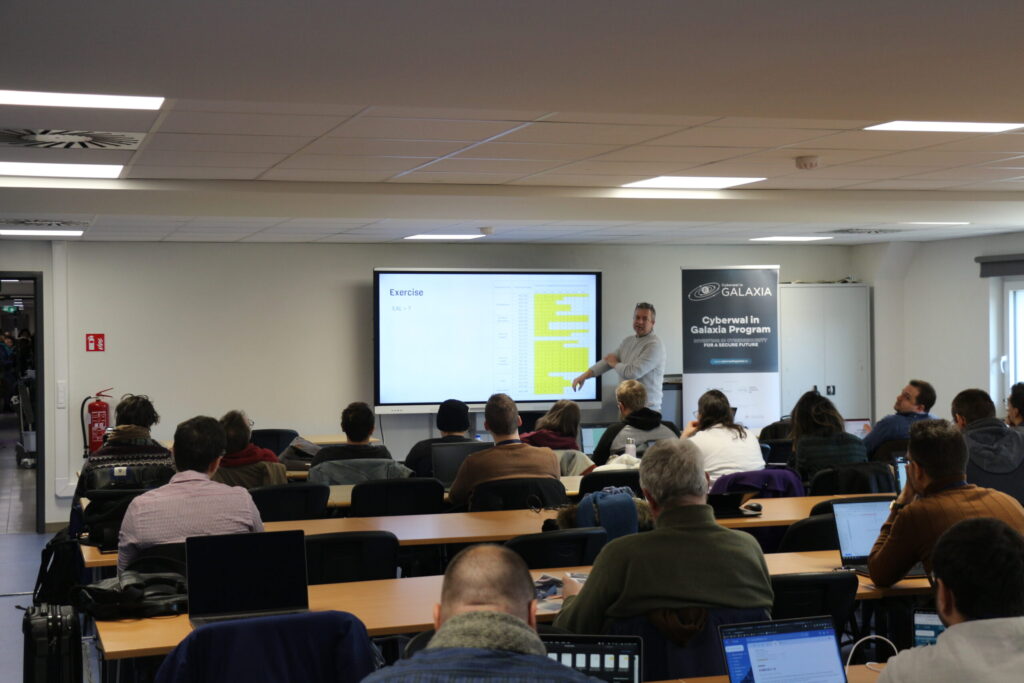
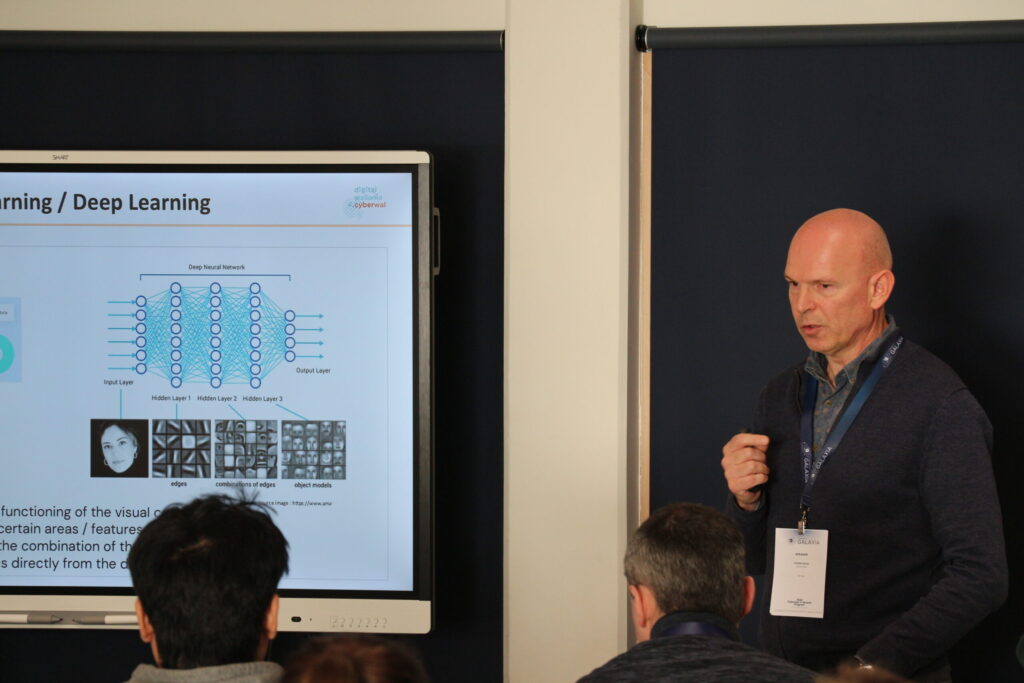





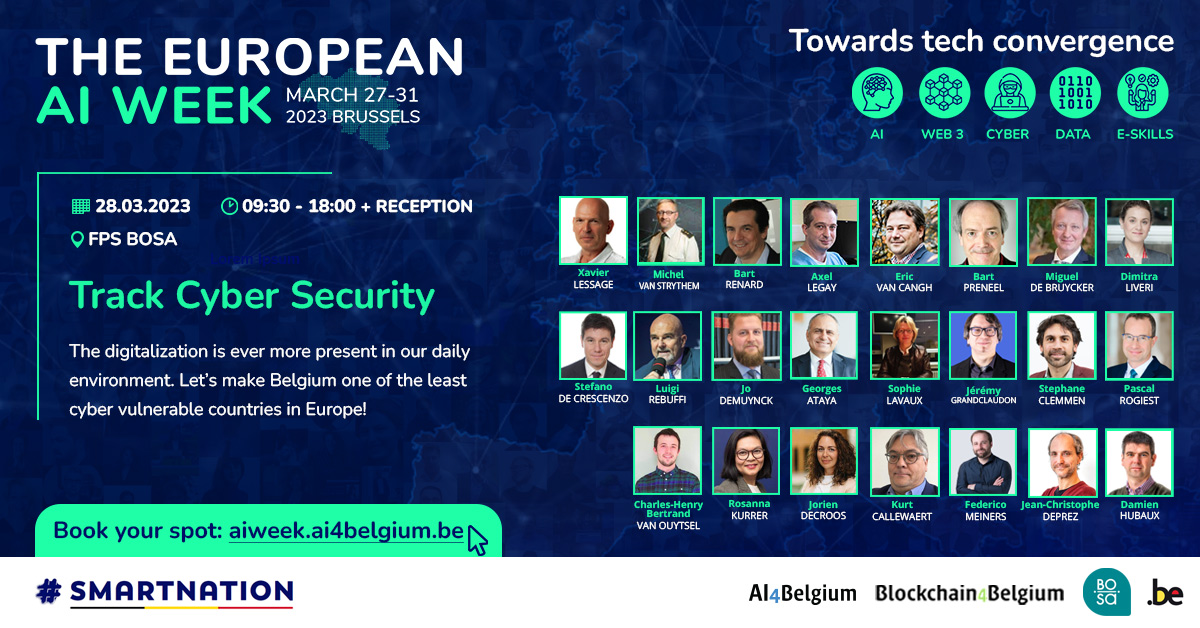
Program :
09:00:00 Opening session cyber security track: The challenges of CyberSecurity
The digitalization is ever more present in our daily environment. It brings immense advantages for our citizens, rendering everyone’s lives easier to manage, connecting more and more people and letting citizens connect to machines. This evolution/revolution is accompanied by the awareness that this needs to be able to evolve in a secure environment and that the potential risks need to be identified and addressed.
10:00:00 The Road to a Cyber Command at Belgian Defence
Securing our nation and protecting the people organizations and systems is a joint effort. The Belgian Cyber Command, takes part in this protection in an active way, supporting the Defence organization as well as other stakeholders and entities.
11:00:00 Franqui Chair on Cybersecurity
Since Caesar, we have protected data through evolving encryption algorithms of different strengths and models. This encryption is being impacted by the arrival of A.I., and down the line by Quantum computing.
A.I. is used as well to create and build, as well as to exploit existing algorithms. The present and the future are affected by this rapid technological and logical evolutions.
12:00:00 How to make Belgium one of the least cybervulnerable countries in Europe ?
The objective of the Centre for Cyber Security Belgium (CCB), Belgium’s national cyber security agency, is to make Belgium one of the least cyber vulnerable countries in Europe, and therefore to effectively protect citizens, public administrations, companies and vital interest operators against the ever increasing and more complex cyber threat. Miguel De Bruycker, Director General of the CCB, will present the policy implemented to achieve this ambitious objective, and the concrete projects associated with it.
Cybersecurity must become a routine part of everyone’s daily life. This will be possible thanks to the implementation of an « active cyber protection » and its 4 pillars which are the involvement of users, the undermining of malicious infrastructures, spearwarning, and validated services. The definition of a complete, applicable and certifiable security framework will also play an important role, as well as concrete support for organisations. This approach is of course in line with the constantly changing European regulatory context.
14:00:00 How to boost Cyber Skills in Belgium ?
With the emergence of A.I., the training and knowledge of operators in security evolves rapidly. The increase in capacity on the defensive and offensive sides created by A.I. bring with it challenges in an already tense market where security resources are scarce.
A.I. will support the security staff but also create new threats and ways of defense. The skill sets at all levels of the security spectrum will need to evolve through new curriculums, new training and new profiles to address the challenges.
15:00:00 Cybersecurity Plans and Projects
The different regions of Belgium know their organizations and setups in the field of cybersecurity. This is a moment where we can discover the ongoing initiatives, the possible learnings and get insights in best practices.
16:00:00 Quantum Computing & Cyber
The current impact of the evolving presence of A.I. in society will likely increase exponentially with the arrival of Quantum computing. It is likely that current security best practices will be under pressure with this evolution, and that we will need to adapt to the ever quicker learning machines.
17:00:00 AI & Cyber
Cyber is affected in several ways by A.I., both in the offensive and defensive fields. Cyber-attack are already appearing through the (mis)use of deep-fake videos, and used in practice by criminal extortion gangs and in state sponsored FIMI campaigns. On the other hand, cyber protection is also enhanced by well deployed A.I. countermeasures.
18:00:00 Evening conference – Networking Cyber in Belgium
The Cyber Resilience in Space Workshop is a gathering focused on the crucial intersection of space technology, cyber, and defense. This workshop aimed to explore, discuss, and strategize on the present challenges, trends, and future actions essential to ensure cyber resilience in space.
Overview:
In today’s digital age, space infrastructure is more connected and reliant on technology than ever before. This increased interconnectivity introduces vulnerabilities and risks that demand a cohesive and proactive approach to cybersecurity. The Cyber Resilience in Space Workshop serves as a platform to address these challenges and collaboratively reflect on resilient solutions.
Workshop Focus:
The workshop was divided into two comprehensive panels, each examining distinct yet interconnected aspects of the space cyber-resilient landscape.
Panel 1: Current Landscape – Mapping Challenges: This panel delved into the current state of space cyber resilience, identifying trends, vulnerabilities, and existing gaps. Experts from diverse backgrounds assessed ongoing challenges, providing insights into evolving cyber threats to space assets.
Panel 2: Future Strategies – Forging Resilience: The second panel charted the course forward, aiming to explore strategies, policies, and actionable measures to address identified gaps and bolster the resilience of space assets. Discussions revolved around potential regulatory frameworks, technological innovations, industry support, and investments required to fortify the cyber resilience of space assets, both ground and space-based.
Join the Discussion: This workshop welcomed industry experts, policymakers, academics, and professionals passionate about the secure and sustainable future of space technologies. Participants engaged in thought-stimulating discussions and collaborative efforts to outline a path toward a more resilient space ecosystem.
Key Objectives:
- Identification of current challenges and vulnerabilities of space technologies..
- Formulation of actionable strategies and policies for enhanced cyber resilience.
- Encouraging cross-sector collaboration and knowledge-sharing among stakeholders.
- Promoting innovative approaches and investments towards cyber resilient space technologies.












